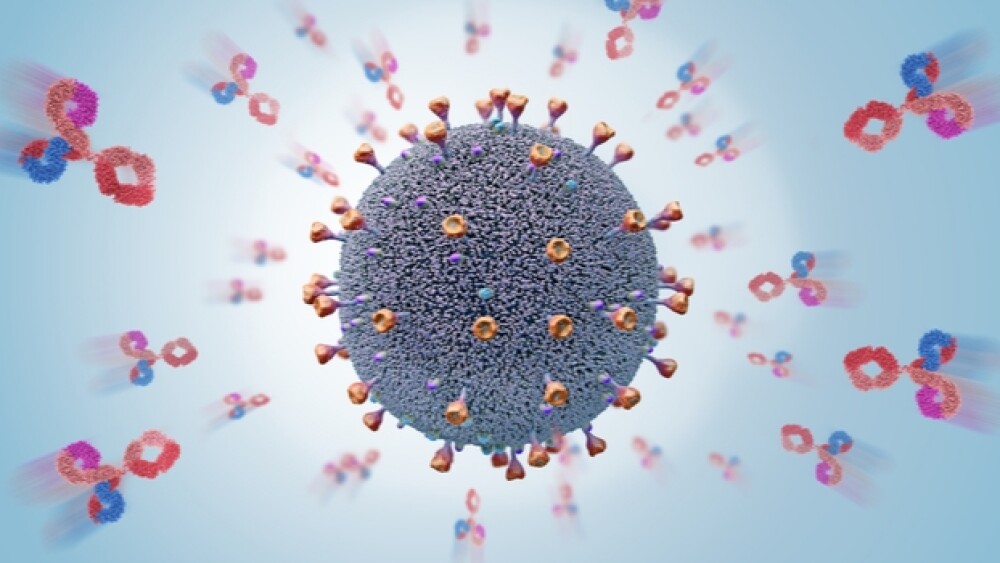This morning Johnson & Johnson announced preclinical data that showed its lead vaccine candidate protected against infection with SARS-CoV-2, the virus that causes COVID-19.
Johnson & Johnson’s experimental COVID-19 vaccine candidate generated neutralizing antibodies in preclinical studies. The announcement comes days after the life sciences giant initiated a Phase I/IIa clinical study of its vaccine candidate, Ad26.COV2.S.
This morning Johnson & Johnson announced preclinical data that showed its lead vaccine candidate protected against infection with SARS-CoV-2, the virus that causes COVID-19. The company’s investigational adenovirus serotype 26 (Ad26) vector-based vaccine elicited a robust immune response as demonstrated by “neutralizing antibodies,” successfully preventing subsequent infection and providing complete or near-complete protection in the lungs from the virus in non-human primates (NHPs) in the pre-clinical study, Johnson & Johnson announced this morning. The data from the primate study was published in Nature.
The preclinical data showed that of seven vaccine prototypes tested in the study, Ad26.COV2.S elicited the highest levels of neutralizing antibodies to SARS-CoV-2. The level of antibodies correlated with the level of protection, confirming previous observations and suggesting they could be a potential biomarker for vaccine-mediated protection. The six NHPs that received a single immunization with Ad26.COV2.S showed no detectable virus in the lower respiratory tract after exposure to SARS-CoV-2, and only one of six showed very low levels of the virus in a nasal swab at two time points.
J&J’s Ad26.COV2-S is an investigational SARS-CoV-2 vaccine built using the AdVac recombinant technology. The technology being used to develop the vaccine candidate is in use by J&J subsidiary Janssen Pharmaceuticals. The AdVac and PER.C6 technology have been used to develop and manufacture the company’s Ebola vaccine as well as to develop its vaccine candidates for Zika, RSV, and HIV.
Paul Stoffels, J&J’s chief scientific officer, said he was excited about the preclinical data, which shows the vaccine candidate’s potential efficacy against the novel coronavirus that has been responsible for more than 150,000 deaths in the United States. The disease has infected more than 17 million people across the globe.
“The findings give us confidence as we progress our vaccine development and upscale manufacturing in parallel, having initiated a Phase 1/2a trial in July with the intention to move into a Phase 3 trial in September,” Stoffels said in a statement.
The Johnson & Johnson vaccine program, which has been supported from $1 billion in funding from the Biomedical Advanced Research and Development Authority (BARDA), is evaluating both one- and two-dose regimens of Ad26.COV2.S in parallel studies. The Phase 1/2a trial will evaluate the safety, reactogenicity and immunogenicity of Ad26.COV2.S in over 1,000 healthy adults aged 18 to 55 years, as well as adults aged 65 years and older.
The pre-clinical studies were conducted by researchers from Beth Israel Deaconess Medical Center (BIDMC) in collaboration with the Janssen Pharmaceutical Companies of Johnson & Johnson. Dan Barouch, director of the Center for Virology and Vaccine Research at BIDMC and the Ragon Institute, said the pre-clinical data from this study highlights the potential of this SARS-CoV-2 vaccine candidate. Moreover, the data suggest that antibody levels may serve as a biomarker for vaccine-mediated protection, Barouch said.
“As we collectively battle this pandemic, we remain deeply committed to our goal of providing a safe and effective vaccine to the world. Our pre-clinical results give us reason to be optimistic as we initiate our first-in-human clinical trial, and we are excited to enter the next stage in our research and development toward a COVID-19 vaccine. We know that, if successful, this vaccine can be rapidly developed, produced on a large scale and delivered around the world,” Mathai Mammen, Global Head of Janssen Research & Development said in a statement.
As Johnson & Johnson moves through clinical testing of its vaccine candidate, the company has been laying the groundwork for potential mass manufacturing of the preventative medication. Earlier this month, the life sciences giant inked a five-year manufacturing deal with Emergent BioSolutions. Emergent will handle contract development and manufacturing services in a deal that is valued at about $480 million for the first two years. Johnson & Johnson aims to meet its goal to supply more than one billion doses globally through the course of 2021, provided the vaccine is safe and effective.





